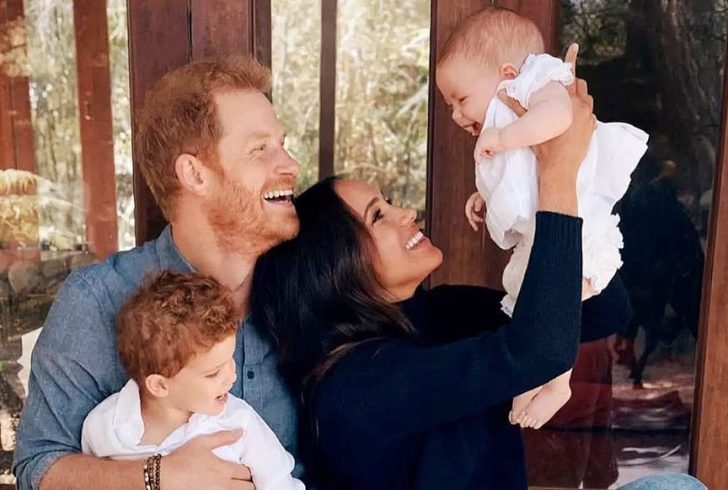
Why Prince Harry and Meghan Markle Hide Their Children’s Faces Online

Prince Harry and Meghan Markle remain two of the most talked-about public figures, yet their approach to sharing details about their children, Archie and Lilibet, is notably cautious. While the couple frequently appears in the public eye, their children’s faces remain largely unseen.
For instance, their 2023 family holiday card omitted the children entirely, and the 2024 card showed them only from behind. This deliberate decision reflects a growing trend among parents, both celebrities and non-celebrities, to prioritize privacy and safety over public exposure.
Growing Concerns About Privacy and Safety
A major reason for this discretion is the rising concern over online privacy. Many parents, including Prince Harry and Meghan Markle, are reevaluating how much of their children’s lives they want to share with the world. The use of images online carries risks such as identity theft, inappropriate alterations through artificial intelligence, and even potential misuse on harmful platforms. With the rapid advancement of technology, these risks are becoming more evident.

Instagram | gossiproomoff | Prince Harry and Meghan Markle prioritize family privacy.
Public figures also face unique challenges. Balancing personal branding with protecting their children’s privacy is a tightrope act. Celebrities often feel pressure to maintain an image of being both relatable and authentic while shielding their families from public scrutiny. By limiting their children’s visibility, they can offer a glimpse into their lives while maintaining some control over what’s shared.
A Shift in How Parents Share Online
The decision to avoid publicly sharing children’s faces isn’t exclusive to celebrities. Many parents today are reconsidering what they post online. Some opt for middle-ground approaches, like covering their children’s faces with emojis or sharing photos only with close friends. Others have stopped sharing entirely, citing the digital permanence of online content as a key concern.
Sarah Adams, an online safety advocate from Mom Uncharted, has observed a shift in parental behavior. She explains, “Parents are becoming more aware of the long-term implications of sharing their children’s lives online. Privacy, safety, and the risks of exploitation are now top priorities.”
Author Devorah Heitner, who wrote “Growing Up in Public: Coming of Age in a Digital World,” highlights additional concerns, such as the risks posed by facial recognition technology. Photos of children can remain online indefinitely, often in ways that were never intended. This digital permanence, combined with the fear of misuse, has led many parents to adopt a more cautious approach.
Why Celebrity Parents Are Extra Careful
For high-profile parents like Prince Harry and Meghan Markle, the stakes are even higher. Their global fame means their children’s photos could spread far beyond their intended audience. Even seemingly innocent images could end up on unauthorized sites or be altered inappropriately.
Additionally, public figures often face intense judgment over their parenting choices. From how they dress their children to the vacations they take, every detail is scrutinized. Limiting the exposure of their children helps mitigate this pressure. By sharing carefully curated glimpses, they can maintain their public image while protecting their family’s privacy.
Devorah Heitner notes that sharing photos online often serves a dual purpose. It’s not just about the kids—it’s also about the parents. Social media can create an expectation to share, leading parents to feel pressure to showcase their children to prove their love or pride. However, as Heitner points out, this kind of sharing is rarely as authentic as it appears. For celebrities, every post is carefully curated, blending personal branding with public demand.
The Role of Technology in Shaping Privacy Decisions
Advancements in technology, particularly artificial intelligence, have amplified concerns about online sharing. AI can alter images in ways that parents might not anticipate, creating a new layer of risk. Facial recognition technology further complicates matters, as it can potentially track children’s movements and build digital profiles without parental consent.

Instagram | freepik | Prince Harry and Meghan Markle embrace privacy for their children.
Parents today are also more aware of the psychological effects of growing up in the digital age. For tweens and teens, having their childhood photos permanently available online can lead to issues with self-esteem or body image. Heitner advises parents to establish boundaries, such as seeking their children’s permission before posting photos.
Alternatives to Public Sharing
While some families step back from sharing altogether, others explore alternative platforms and methods. Private photo-sharing sites, such as Flickr, are gaining popularity among those who want to share memories with trusted individuals. Group texts and password-protected micro-communities are also becoming more common, offering a safer way to connect with friends and family without exposing content to the wider internet.
For parents who still wish to share publicly, experts recommend taking precautions. Avoiding images of children in swimsuits or compromising situations is a good start. Ensuring photos don’t reveal too much personal information, like location or school names, is another crucial step.
The Bigger Picture
The decisions made by Prince Harry and Meghan Markle reflect a broader cultural shift in how families approach privacy in the digital age. As technology continues to evolve, so do the risks associated with sharing personal information online. Parents, both famous and not, are learning to navigate these challenges by prioritizing their children’s safety and well-being.
The hunger to share life’s moments will likely never disappear, but the ways in which people choose to share are changing. Whether through private platforms or selective sharing, the goal remains the same: to preserve memories while protecting loved ones.
More in Entertainment
-
`
Ben Affleck, Gillian Anderson to Lead Netflix Movie ‘Animals’
Netflix has officially announced “Animals,” an upcoming crime thriller featuring Oscar-winner Ben Affleck in both a lead role and as the...
February 19, 2025 -
`
US Opposes Hezbollah Ally’s Appointment to Lebanon’s Finance Ministry
The United States is actively pressuring Lebanese officials to block Hezbollah and its allies from selecting the country’s next finance minister....
February 12, 2025 -
`
Ed Sheeran Becomes the First International Artist to Perform in Bhutan
Ed Sheeran has achieved a groundbreaking milestone in his music career. The “Bad Habits” singer, 33, became the first international artist...
February 5, 2025 -
`
New Jersey Issues Warning to 11,000 Businesses for Selling Flavored Vapes
In New Jersey, flavored vape products are illegal, but thousands of businesses continue to violate the law. According to Attorney General...
January 29, 2025 -
`
Why Are Innovation Hubs Crucial for Entrepreneurial Success?
Innovation hubs are transformative spaces that empower entrepreneurs by providing the resources, mentorship, and collaborative environments needed to turn their ideas...
January 14, 2025 -
`
How to Finance an ATM Business in 3 Easy-to-Follow Steps
Starting an ATM business can be a fantastic way to earn passive income, but the first hurdle is figuring out how...
December 19, 2024 -
`
Former RXBar CEO Peter Rahal is Betting Everything on New Protein Bar Startup, David
Peter Rahal, the visionary entrepreneur behind RXBar, is back with a bold new venture. After selling RXBar to Kellogg’s for a...
December 15, 2024 -
`
Can investing in Nvidia Still Offer Value After Its Explosive Growth?
This year, Nvidia has been one of the stock market’s most impressive performers. Starting at $50 per share (split-adjusted) in January,...
December 6, 2024














You must be logged in to post a comment Login